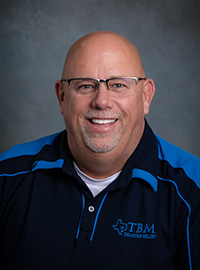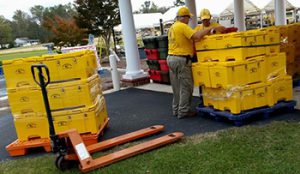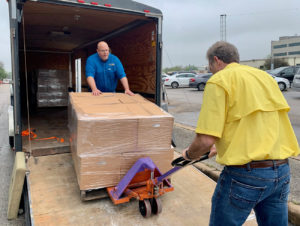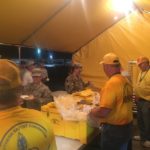Multiple agencies have predicted a particularly active hurricane season in 2020. Dwain Carter with Texas Baptist Men prays the experts are wrong.
Carter, state disaster relief director for TBM, recognizes the challenges of providing help and hope to hurricane survivors in the midst of the COVID-19 pandemic.
“We’ve put into place a new set of guidelines for volunteers,” Carter said.
TBM also has been busy working through the logistics of providing disaster relief in a time of social distancing, he added.
The Atlantic hurricane season—which includes the Gulf of Mexico—begins June 1. More than a dozen government, university and private agencies have predicted a season of above-average activity, and some forecasts call for an extremely active season with nine or more hurricanes.
Pray for the best, prepare for the worst
“We’re praying that nothing takes place,” Carter said.

But TBM is preparing to serve in a far-from-normal environment, he added.
“When a disaster happens, the closest units will go first,” he explained.
Whenever possible, trained disaster relief volunteers from within a two-hour driving radius of the disaster site—two and a half hours at the most—will be the first teams deployed.
Sign up for our weekly edition and get all our headlines in your inbox on Thursdays
Ideally, volunteers will live close enough to drive back and forth to their homes each night, he explained.
Typically, churches have opened their facilities to house TBM volunteers during disasters. However, at this point, some church facilities remain closed due to COVID-19. Churches that have opened their facilities for worship have been urged to follow strict protocols to keep them sanitized and reduce the risk of spreading the virus.
So, TBM will find other lodging, when necessary, Carter explained.
“If necessary, they will be housed in multiple locations rather than one centralized location,” he said.
When a deadly tornado hit Onalaska in April, the needs were greater than what nearby TBM volunteers alone could meet. Trinity Pines Camp and Conference Center, about 20 miles to the northwest of Onalaska, housed the TBM crews.
Protecting volunteers and the public
To provide proper social distancing, TBM will permit no more than two volunteers to travel together in one vehicle, Carter said. Cooking teams will be limited to 10 volunteers. Cooks will be required to wear masks, and other volunteers will be urged to wear face coverings when appropriate.

Volunteers will have their temperature checked every morning, and directors will keep a log detailing that information. Anyone exhibiting symptoms of COVID-19 is not allowed to work on a TBM project.
Carter recognizes a significant number of TBM disaster relief volunteers are retired individuals who likely are in a high-risk category for COVID-19. TBM continues to remind them if they are not comfortable serving at this time, they are not obligated to do so, he said.
Typically, TBM disaster relief volunteers cook hot meals in a field kitchen and put the food in large insulated containers that the American Red Cross distributes to shelters and affected areas.
“Right now, Red Cross is not feeding in the normal way,” Carter said.
During the pandemic, Red Cross is housing displaced disaster survivors in hotel rooms rather than congregate shelters. The agency is providing food in vendor-style box meals rather than filling plates and bowls in a serving line.
TBM is adjusting to the new requirements, preparing to serve individually packaged meals rather than pouring large quantities of food into insulated carriers.
“It will be very labor intensive,” he acknowledged.
TBM responds to COVID-19 crisis
While preparing for “traditional” natural disasters, TBM also has responded specifically to the COVID-19 crisis.

TBM provided 15,000 N95 masks and 2,000 biohazard suits to medical professionals and first responders around the state. TBM mud-out crews normally use the protective devices when they are disinfecting a home that has been flooded.
Next, TBM delivered 1,200 pairs of protective glasses and four pallets of plastic sheeting to the Baylor Scott and White Health Faith in Action Initiatives.
Most recently, the group launched a TBM Feeding Texans initiative to multiply the capacity of church-based food pantries and Christian ministries around the state to provide meals to unemployed Texans. Initially, TBM committed to provide 50,000 meals. The response was so great, TBM doubled that number.
To give online to support TBM disaster relief, visit TBMTX.org/donate. To contribute financially by mail, send a check designated “disaster relief” to Texas Baptist Men, 5351 Catron Dr., Dallas, TX 75227.
















We seek to connect God’s story and God’s people around the world. To learn more about God’s story, click here.
Send comments and feedback to Eric Black, our editor. For comments to be published, please specify “letter to the editor.” Maximum length for publication is 300 words.